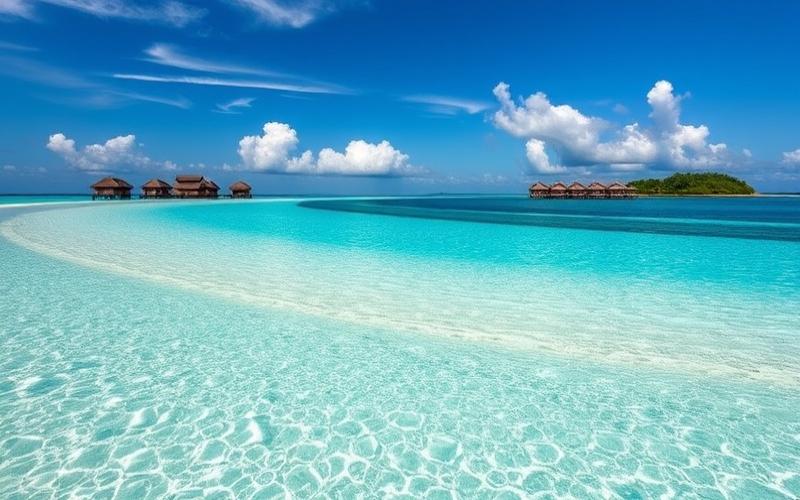
 Published on and written by Cyril Jarnias
Published on and written by Cyril Jarnias
The Seychelles, an idyllic archipelago in the Indian Ocean, are attracting a growing number of foreign investors drawn by its white sand beaches and turquoise waters. But beyond the paradise setting, this country offers a favorable environment for real estate investment thanks to supportive legislation and advantageous taxation. Let’s dive into the nuances of the Seychellois real estate market to understand why it represents a golden opportunity for savvy investors.
Property Rights in Seychelles: An Open Door for Foreigners
Unlike many countries that restrict property access for non-residents, Seychelles has adopted an open policy toward foreign investors. Since 2003, Seychellois legislation has allowed foreigners to acquire real estate properties in full ownership, without needing prior government approval. This liberalization of the real estate market has significantly stimulated foreign investment in the country.
However, it should be noted that some restrictions remain. Foreigners can only purchase properties located in designated areas, primarily luxury residential complexes or government-approved development projects. These areas, called “Designated Areas,” are specifically designed to accommodate foreign investment and often offer high-quality infrastructure.
Foreign investors can acquire villas, apartments, or even building plots in these designated areas. This policy aims to preserve the balance between economic development and the protection of Seychelles’ natural and cultural heritage.
Good to know:
Foreigners can purchase real estate in Seychelles without major restrictions, but only in designated areas. This policy encourages foreign investment while preserving the country’s identity.
The Legal Framework of Seychellois Real Estate: A Secure Environment
The Seychelles legal system, inherited from Anglo-Saxon law and French civil law, provides a solid framework for real estate transactions. The main law governing real estate is the “Land Registration Act” of 1965, which establishes a land title system guaranteeing the security of property rights.
Here are the main legal provisions to know:
- Mandatory registration: All real estate transactions must be registered with the “Land Registry,” ensuring transparency and legal security.
- Sales contract: A written contract is required for any real estate sale, detailing the transaction conditions.
- Due diligence: Buyers are encouraged to conduct thorough checks on the property and seller before finalizing the purchase.
- Property transfer: The transfer process is supervised by a notary or lawyer, ensuring compliance with legal procedures.
Additionally, the Seychellois government has implemented measures to protect foreign buyers. The “Seychelles Investment Board” (SIB) plays a crucial role by providing information and assistance to foreign investors, guiding them through purchase procedures and local regulations.
It is important to note that Seychelles has also adopted strict laws regarding money laundering and terrorist financing. Buyers must therefore be prepared to provide proof of the origin of funds used for the real estate purchase.
Good to know:
The Seychellois legal framework offers strong protection to real estate investors, with clear and transparent procedures. Due diligence and recourse to local professionals are essential to secure transactions.
Real Estate Taxation in Seychelles: An Attractive Regime for Investors
One of Seychelles’ main assets for real estate investors is its advantageous tax regime. The country has implemented a tax policy aimed at attracting foreign investment, with relatively low tax rates and interesting exemptions.
Here are the main aspects of real estate taxation in Seychelles:
- Real estate transaction tax: Buyers must pay a property transfer tax of 5% of the property’s value.
- Rental income tax: Rental income is subject to a tax rate of approximately 15%, which remains competitive compared to many other countries.
- Property tax: There is no annual property tax in Seychelles, representing significant savings for owners.
- Real estate capital gains: Capital gains realized from the resale of a property are not taxed, making long-term investments particularly attractive.
- Inheritance rights: Seychelles does not apply inheritance taxes, thus facilitating the transfer of real estate assets.
Furthermore, Seychelles has concluded tax treaties with several countries, thus avoiding double taxation for foreign investors. This favorable tax policy helps maximize the return on real estate investments in the country.
However, it is important to note that tax laws can change. Investors are therefore encouraged to consult local tax experts for personalized and up-to-date advice.
Good to know:
The Seychellois tax regime is particularly attractive for real estate investors, with low tax rates and the absence of certain common taxes in other countries. However, it is crucial to stay informed of potential legislative changes.
Owner Rights and Obligations: A Balance Between Freedom and Responsibility
In Seychelles, real estate owners enjoy extensive rights but must also respect certain obligations. Seychellois legislation aims to protect owner interests while ensuring responsible management of real estate assets.
Owner rights:
- Right of use and enjoyment: Owners have full control of their property, being able to occupy, rent, or sell it at their discretion.
- Protection against expropriation: The Seychelles Constitution guarantees the right to private property, with strict procedures in case of expropriation for public utility.
- Right to lease: Owners can freely rent their property, with few restrictions on lease conditions.
Owner obligations:
- Compliance with environmental regulations: As Seychelles is recognized for its unique biodiversity, owners must respect strict standards for environmental protection.
- Property maintenance: Owners are required to maintain their property in good condition, in accordance with local standards.
- Compliance with urban planning rules: Any modification or construction must comply with current urban planning regulations.
- Payment of charges: Owners must pay charges related to their property, especially in residential complexes.
An important aspect to consider is property management in the owner’s absence. For foreign investors who do not reside in Seychelles, it is recommended to use local management companies to ensure maintenance and potential rental of the property.
Regarding leasing, leases are generally flexible in Seychelles. Owners can freely negotiate contract terms with tenants but must respect certain basic legal provisions, particularly regarding notice periods and security deposits.
Good to know:
Real estate owners in Seychelles benefit from great freedom in managing their property but must be attentive to environmental and urban planning regulations. For non-resident owners, professional local management is recommended.
Regulatory Developments: A Market in Constant Adaptation
The regulatory framework for real estate in Seychelles regularly evolves to adapt to market trends and economic and environmental challenges. In recent years, several significant changes have been made, aiming to strengthen market attractiveness while preserving national interests.
Among recent developments, we can note:
- Strengthened anti-money laundering controls: Seychellois authorities have reinforced fund origin verification procedures for real estate transactions, in line with international standards.
- Sustainable development: New regulations have been introduced to promote sustainable construction and energy efficiency in new real estate projects.
- Digitalization of procedures: The government has launched initiatives to digitize property registration processes and tax payments, thus simplifying procedures for investors.
- Revision of designated areas: The government regularly reassesses areas open to foreign investors, seeking a balance between economic development and heritage preservation.
An important trend is the emphasis on sustainable real estate development. Seychellois authorities increasingly encourage environmentally friendly projects, with tax incentives for green construction. This direction reflects the country’s commitment to preserving its unique ecosystem while developing its real estate sector.
Furthermore, the Seychellois government is currently working on new regulations to govern the short-term rental market, particularly for platforms like Airbnb. These rules could significantly impact investors seeking to generate rental income.
It is crucial for investors to stay informed of these regulatory developments. Regular consultation with local legal and real estate experts is recommended to ensure compliance with new regulations.
Good to know:
The regulatory framework for real estate in Seychelles is constantly evolving, with increasing emphasis on sustainability and transparency. Investors must remain vigilant and adapt to these changes to optimize their investments.
Conclusion: Seychelles, A Promising Real Estate Market for Savvy Investors
Real estate investment in Seychelles offers unique opportunities for international investors. With a stable legal framework, advantageous taxation, and an evolving market, the archipelago positions itself as a destination of choice for diversifying real estate portfolios.
The major strengths of the Seychellois real estate market include:
- Legislation favorable to foreign investors
- An attractive tax regime
- An exceptional natural environment
- Significant growth potential in the tourism market
- Relative political and economic stability
However, as with any international investment, it is essential to approach the Seychellois market with caution and preparation. Thorough due diligence, consultation with local experts, and a clear understanding of current regulations are crucial for successful investment.
Seychelles continues to attract investors from around the world, drawn by the prospect of owning a piece of paradise while benefiting from tax advantages and attractive return potential. With a thoughtful and well-informed approach, real estate investment in Seychelles can prove to be a wise decision for diversifying assets and enjoying an exceptional living environment.
Disclaimer: The information provided on this website is for informational purposes only and does not constitute financial, legal, or professional advice. We encourage you to consult qualified experts before making any investment, real estate, or expatriation decisions. Although we strive to maintain up-to-date and accurate information, we do not guarantee the completeness, accuracy, or timeliness of the proposed content. As investment and expatriation involve risks, we disclaim any liability for potential losses or damages arising from the use of this site. Your use of this site confirms your acceptance of these terms and your understanding of the associated risks.













































